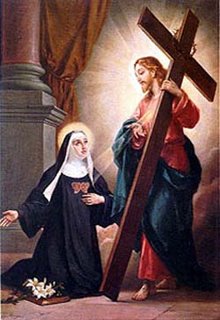
Clare Vengente was born in the year 1268 in the region of Montefalco, Italy. Her parents were prosperous so money was not a critical issue both Clare's parents instilled in their children a great devotion towards their Faith, which Clare took very much to heart as she grew in devotion towards God and the Church.
One of Clare's greatest examples was her sister Joan who practiced mortifications and penances as was common to this particular Era in time. Both Joan and Clare in their zealousness and love for God practiced denying their physical needs as in limiting their eating and other forms of bodily penances. As both Clare and her sister had an abhorrence and dread of even the slightest sin that may offend their beloved Jesus and the Blessed Mother.
The parents of both Joan and Clare, Damiano and Iacopa Vengente encouraged their daughters in this zealous love for God and provided them with their own hermitage which their father built for his daughters not far from the family home. This enabled both of their daughters the ability to withdraw from recreations and spend days and weeks in prayer and the practice of penances at times very severe penances.
Even though Clare loved God with a passionate love, this did not stop her suffering a severe sense of abandonment, this trial lasted 11 long years as Clare suffered the loss of 'feelings' as our Lord guided her towards a more mature love of Himself. During this ordeal Clare did not lose her Faith even though she suffered much. At times God calls all the souls who are particularly devoted to Him along the path of thorns rather than rose petals, though Clare did not doubt Gods Power she did have doubts about her own worthiness which plagued her for many years.
It was in 1290 that Joan and Clare's hermitage which had been built by their father became a monastery, the Bishop decided that the Monastery would be run by the Rule of St. Augustine. When the Bishop sent his envoy to Montefalco in order to vote for an Abbess the election outcome was that Clare was voted in by a majority. This did not appeal to Clare who merely wanted to serve her community and not be in charge of it, after pleading to her fellow Sisters who refused to hear them, Clare accepted the position of Abbess reluctantly.
Clare was to prove herself to be a worthy Abbess as she nurtured her community and helped them to keep a joyful interior as they did their daily round of chores and a life of prayer and penances. Her diplomacy in being able to guide this small group of women with no rancour was indeed meritorious as she wisely governed the Convent not with an iron hand but with the hand of a mother.
Though Clare continued her practice of mortification this did not lead her to become an unhappy or dour personality, indeed many came to love Clare for the happiness that sprung from her very nature and the wisdom and compassion she showed to her fellow Sisters and in the service of the poor in the community. Many came to not only love Clare but also to respect the obvious holy content of her very essence and many paid visits to her monastery in order to gain advice and to simply lift their spirits in the company of one so full of love and compassion.
Clare's particular devotion was for the Crucified Lord and she spent many hours in compassioning prayer for the suffering our Lord endured for the salvation of sinners. Her whole life revolved around pleasing her Lord and offering up her own sufferings for the sake of poor sinners. This focus on Christ's Passion was not done from a sense of morbidity but one of deep devotion and also Mystical experiences of what our Lord suffered as He endured the pain of the Crucifixion.
Through the years of practicing severe penances took a heavy toll on Clare's own health and so it was that she suffered through her last illness once again offering up her pains for the forgiveness of sins committed against God.
Clare Vengente died in 1308.
St. Clare of Montefalco was Canonized in 1881 by Pope Leo XIII.
Peace of Christ to ALL
Copyright © 2006 Marie Smith. All rights reserved.
Roman Catholic
Catholic Saints